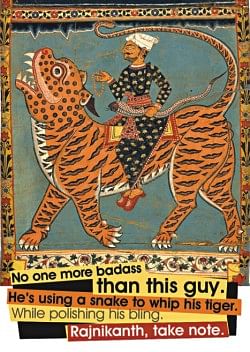
Tiger God and the Croc Demon
By Anika Ali & Adnan M. S. Fakir
 Every year thousands of villagers flood a mausoleum located in Jhenaidaha. The mausoleum houses a huge banyan tree and people tie various threads and ribbons to its hanging branches; each thread representing a prayer, a wish. Nothing new; however, this mausoleum is special. The histories of the man who now rests here have become mythologies. He is the great tiger tamer of our lands, the strange man who ran away from being king and decided to spread Islam instead. We give you the eccentric (you will read why soon) and vibrant tale of the infamous brother Gazi & Kalu and the beautiful Chompabati. Yes, cupid is involved as well.
Every year thousands of villagers flood a mausoleum located in Jhenaidaha. The mausoleum houses a huge banyan tree and people tie various threads and ribbons to its hanging branches; each thread representing a prayer, a wish. Nothing new; however, this mausoleum is special. The histories of the man who now rests here have become mythologies. He is the great tiger tamer of our lands, the strange man who ran away from being king and decided to spread Islam instead. We give you the eccentric (you will read why soon) and vibrant tale of the infamous brother Gazi & Kalu and the beautiful Chompabati. Yes, cupid is involved as well.
The story starts when Gazi refused his father, King Shah's command to become king. Furious, King Shah punished Gazi by throwing him into scorching flames and having him trampled by trumpeting elephants. Utterly horrified (and rightfully so), Gazi fled to the Sundarbans with his adopted brother, Kalu.
And you thought your parents were unreasonable.
In the Sundarbans, Gazi came across many tigers and learned to tame them. Don't ask us how. This made him famous as the “Tiger God” and thus his journey began. Gazi, Kalu and their team of tigers travelled across kingdoms and spread the practice of Islam. Eventually they arrived at Brahmannagar, a thoroughly Hindu region. Mukut Rai, the ruler of this land, had seven sons and one daughter; the beautiful Chompabati. Remember the song that goes “shaat bhai chompa jago re”? That one's about these folks.
Anyway, Gazi fell in love with Chompabati and wanted to marry her. So he sent Kalu to Mukut Rai with a proposal to marry Chompabati. Mukut Rai however was a Brahmin and really detested Muslims. Where a simple rejection might have sufficed, Mukut Rai imprisoned Kalu.
Sure enough, Gazi became really angry and attacked Mukut Rai's kingdom with a large number of tigers. Dakkhin Rai, the most powerful general of Mukut Rai, was also a gifted man and had the ability to tame and train crocodiles. Yes, fighting crocs; again, don't ask us how. He brought an army of crocodiles to combat Gazi's tigers. The tigers put up a real catfight and after much clawing and biting, Dakkhin Rai was finally defeated. The victorious Gazi cut off Dakkhin Rai's ears and his tiki (which was his twelve feet long braid and more importantly, a symbol of his higher caste) and imprisoned him.
Mukut Rai was now really angry. He attacked Gazi Shah with an enormous army of twelve hundred million and nine hundred soldiers (that's 1,200,000,900 soldiers; yes the original account says so) and an insane number of cannons (we are assuming this part of the tale is not historically correct; don't ask about the others). Gazi Shah's tigers revved up for war and yet another combat began. Summarising the story so far, Mukut Rai imprisoned Gazi Shah's brother so Gazi Shah imprisoned Mukut Rai's most powerful general. This made Mukut Rai attack Gazi Shah with more ammunition than most of us can count. Both have someone dear in prison, both are fighting an enormous battle, things are even. Check.
But then Mukut Rai did something strange.
Every night during the war, Mukut Rai used to revive his dead soldiers, horses and elephants by splashing them with water from the Mrityujeeb Koop. We can't really tell whether the revived men were zombies, but when Gazi Shah discovered this, he apparently neutralised the magic of the well by throwing cow blood in it. Without the power to revive his millions of soldiers, Mukut Rai was defeated (with his millions of soldiers). Told you tigers rule!
In the end, Mukut Rai and all the people of his kingdom accepted Islam. Gazi finally got to marry Chompabati and they lived happily ever after in a land far far away. Somewhere.
Puns aside, this mythology carries great significance for many people in rural Bangladesh, and all mythologies have some truth hidden in them. Like a famous TV show once said, “The truth is out there.” Go find 'em.
For more mythologies and love stories catch us at www.facebook.com/findingbangladesh
Farewell, Wordsmith
By Jawad
 "MAIR-ER MODDHE BHITAMIN ASE.” We used to say it with our friends, most of us unaware or forgetful of the origin. But within us, an idea resonated. Back-brushed hair, chaap-daari, denim jackets and sunglasses in the night; a swinging key-ring and the immortal Baker Bhai. A fictional character that induced impromptu rallies for his pardon; a death on camera that a nation mourned. That by itself is the highest accolade that any writer/director can ever dream of. How many Nobel literature laureates can boast that effect? How many Oscar winners?
"MAIR-ER MODDHE BHITAMIN ASE.” We used to say it with our friends, most of us unaware or forgetful of the origin. But within us, an idea resonated. Back-brushed hair, chaap-daari, denim jackets and sunglasses in the night; a swinging key-ring and the immortal Baker Bhai. A fictional character that induced impromptu rallies for his pardon; a death on camera that a nation mourned. That by itself is the highest accolade that any writer/director can ever dream of. How many Nobel literature laureates can boast that effect? How many Oscar winners?
And that's not even going into two of his great creations: Himu and Misir Ali.
These two are arguably the most popular and intriguing characters in Bangladeshi literature. There are people who went to the Ekushey Boimela solely for his novels, going crazy for his yearly Himu or Misir Ali books.
Humayun Ahmed was never a writer who relied on complex words; precise, simple and filled with deep insights, his style is unmistakeable. His sense of humour and the sudden, random quips kept the readers glued even more tightly to his novels, short stories, TV dramas, films and even autobiographies.
And you have to wonder, what didn't he write? He wrote sci-fi, he wrote horror, he wrote mystery, he wrote romance. He even wrote children's stories (the kind in big letters and flashy cartoons). He wrote for the general people, he wrote about the general people. He made the average interesting and inexplicably attractive. In 120 pages, he made us synchronise with his character. He compelled us to turn to books for entertainment.
Aguner Poroshmoni. Kothao Keu Nei. Aj Robibar. Three classics of our motion-picture history, the first being a movie, the latter two TV series. I still laugh when I remember Jahid Hasan's nerdy clumsiness as he regularly slipped on those flights of stairs in Aj Robibar. Shyamol Chaya, Shrabon Megher Din... he made me cry about a Bangla movie. The only other person who managed that is Satyajit Ray. He brought about a change in our cinema industry. Too bad he had but a few to follow in his footsteps.
“Some read it behind closed doors, some read it openly but everyone reads Humayun Ahmed.”
When I read any of his works, be it a short story or a novel, I always found something that I could always connect to. I flocked with others at the stall in the fair, stepped on people's feet and never said sorry. I endured the excruciating pain of a thousand adverts for the dramas he made for Eid. Who will fill the void now?
Rest in peace, Humayun Ahmed.
Weekly Ramadan Munchies
Too many
hours in a day
By Halcyon
Early morning routines, a hot sun overhead and a nice little jam to finish off the afternoon; ramadan in the middle of summer in Bangladesh is usually a thing to dread. But something is different this time around. It's only been two days, yet jams seem a little more bearable than the previous few instalments. Must be because school's out. It hasn't reduced the road rage much though. Previously no one moved, so everyone sat and fumed and got a little more dehydrated because of the heavier breathing that accompanies fuming. Now, there's some room for movement and a lot more bumps and crashes.
Despite having no school to attend, life somehow doesn't feel any easier. My friend and I spend most of our time under the fan, playing Fifa '12. And through our never ending Bayern vs Real Madrid struggle, it slowly dawns on us that school was actually good for something. We have endless hours of leisure with absolutely nothing to look forward to, except iftar, which is, oh man, 7 hours from now!
Success and the anticipation of it is important when your energy is down. It gives you a boost. With school open, we received regular doses of success. First there was the anticipation and fulfilment of chuti, of going home and taking a shower. Then there were the Fifa runs, where there were a certain number of wins to be achieved. And finally, there was the piece de la resistance, i.e. iftar; the magnitude of which was so much greater because of its immediacy and urgency, conveyed by the wafting smell of khichuri and things frying.
Now there's nothing. In this vast emptiness we eventually drop our controllers and go home. The wonderful thing about walking is that it makes you think; whether you are thinking about the girl in the class, or thinking up random scenarios with her or playing out some of the more famous wars in history is a different article entirely. During the walk, I remember this colleague of mine who came back from Omrah recently, with a shaved head and a ridiculous pagri which turned out to be made from shawl that his mother had bought. He told me how a lot of people fast in Medina and at Maghrib, they just invite you to come into the mosque and share in the iftar. There are no strangers and the solidarity is touching. We have that too. We send food to our neighbours throughout the apartment. I remind myself not to forget the daroan mama as I walk through the gates.
On the lift, I wonder whether the rumour is true that some Middle Eastern countries turn their work hours around, working in the night instead of the day. Internet really is a wonderful thing and my distant brother-in-law living in Dubai is an idiot. While many shops and restaurants [one of which he works in] open just before iftar, work hours in offices are reduced.
In other words, it's no different than Bangladesh. It makes sense for the most part.
If you are switching the hours around to whatever is convenient for you, you are reneging on one of the main purposes to Ramadan, that of making you understand the troubles of the less fortunate, those who get through the day with little sustenance.
While browsing through all that info, I get a whiff of that wonderful smell. Yes, something is frying and yes, it smells like chicken. Half an hour to go. With the summer sun refusing to go down, a thought sneaks in the back of my head: if we fast from dawn to dusk, how does it work with places where the sun doesn't go down during summer?
So I checked out the timings for Stockholm, Sweden. Sehri - 1:51AM, Iftar - 10PM.
Patience is a virtue I hope they have in megatons.
